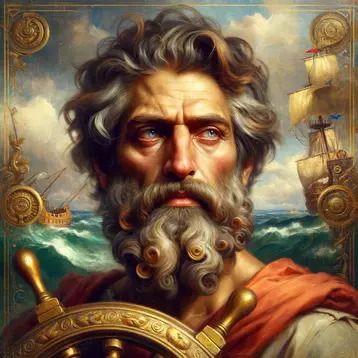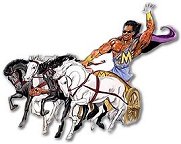|
DETERMINED TO GET HOME TO PENELOPE
Odysseus (called
Ulysses in Latin) was the son of Laertes and was the ruler of
the island kingdom of Ithaca. He was one of the most prominent
Greek leaders in the Trojan War, and was the hero of Homer's
Odyssey. He was known for his cleverness and cunning, and for
his eloquence as a speaker.
Odysseus was one of the original suitors of Helen of Troy. When
Menelaus succeeded in winning Helen's hand in marriage, it was
Odysseus who advised him to get the other suitors to swear to
defend his marriage rights. However, when Menelaus called on the
suitors to help him bring Helen back from Troy, Odysseus was
reluctant to make good on his oath. He pretended to have gone
mad, plowing his fields and sowing salt instead of grain.
Palamedes placed Odysseus' infant son in front of the plow, and
Odysseus revealed his sanity when he turned aside to avoid
injuring the child.
However reluctant he may have been to join the expedition,
Odysseus fought heroically in the Trojan War, refusing to leave
the field when the Greek troops were being routed by the
Trojans, and leading a daring nocturnal raid in company with
Diomedes. He was also the originator of the Trojan horse, the
strategem by which the Greeks were finally able to take the city
of Troy itself. After the death of Achilles, he and Ajax
competed for Achilles' magnificent armor; when Odysseus'
eloquence caused the Greeks to award the prize to him, Ajax went
mad and killed himself.
Odysseus' return from Troy, chronicled in the Odyssey, took ten
years and was beset by perils and misfortune. He freed his men
from the pleasure-giving drugs of the Lotus-Eaters, rescued them
from the cannibalism of the Cyclopes and the enchantments of
Circe. He braved the terrors of the underworld with them, and
while in the land of the dead Hades allowed Thiresias, Odysseus'
mother, Ajax and others to give him adivice on his next journey.
They gave him important advice about the cattle of the sun
(which Apollo herds), Scylla and Charybdis and the Sirens.
From there on the travels were harder for Odysseus, but they
would have been much worse of it wasn't for the help of the
dead. With this newly acquired knowledge, he steered them past
the perils of the Sirens and of Scylla and Charybdis. He could
not save them from their final folly, however, when they
violated divine commandments by slaughtering and eating the
cattle of the sun-god. As a result of this rash act, Odysseus'
ship was destroyed by a thunderbolt, and only Odysseus himself
survived.
He came ashore on the island of the nymph Calypso, who made him
her lover and refused to let him leave for seven years. When
Zeus finally intervened, Odysseus sailed away on a small boat,
only to be shipwrecked by another storm. He swam ashore on the
island of the Phaeacians, where he was magnificently entertained
and then, at long last, escorted home to Ithaca.
There were problems in Ithaca as well, however. During Odysseus'
twenty-year absence, his wife, Penelope, had remained faithful
to him, but she was under enormous pressure to remarry. A whole
host of suitors were occupying her palace, drinking and eating
and behaving insolently to Penelope and her son, Telemachus.
Odysseus arrived at the palace, disguised as a ragged beggar,
and observed their behavior and his wife's fidelity. With the
help of Telemachus and Laertes, he slaughtered the suitors and
cleansed the palace. He then had to fight one final battle,
against the outraged relatives of the men he had slain; Athena
intervened to settle this battle, however, and peace was
restored.
WHOLE LOT
OF EXCELLENT ODYSSEUS FACTS
Based on the Genealogical Guide to Greek Mythology,
by Carlos Parada
Odysseus was king of
Ithaca and leader of the Cephallenians against Troy. He invented
the construction of the WOODEN HORSE as a stratagem to take
Troy. As other ACHAEAN LEADERS Odysseus was confronted, after
the sack of Troy with a hard return and sedition at home. On his
return to Ithaca he killed the many SUITORS OF PENELOPE, who had
been wasting his property during his twenty years long absence,
and for that massacre he was condemned to exile by King
Neoptolemus of Epirus.
The Oath of
Tyndareus.
When Helen was to be
married many suitors came from all Greece wishing to win her
hand, and among them Odysseus. King Tyndareus, Helen's father or
stepfather, feared that the preference of one might provoke the
enmity of the others, and so Odysseus promised that, if
Tyndareus would help him to win the hand of Penelope, he would
suggest a way by which there would be no dispute among the
suitors. When Tyndareus agreed, promising to help him, Odysseus
told him to exact an oath from all the SUITORS OF HELEN that
they would defend the favoured bridegroom against any wrong that
might be done him in respect of his marriage.
So when Menelaus won the hand of Helen, all accepted it in
virtue of the oath, and thus Odysseus married Penelope, who was
the prize for such a wise advice.
But later, when the seducer Paris took Helen from King Menelaus
of Sparta, the kings of Greece, being bound by the Oath of
Tyndareus, were forced, summoned by Menelaus and his brother
Agamemnon, to join the alliance which sailed from Aulis to Troy
in order to demand the restoration of Helen and the property,
either peacefully or by force.
The Oath
against Odysseus.
Thanks to the idea
of the oath Odysseus won Penelope, but when war threatened
against Troy, the same oath played against him bounding him to
join the coalition that was gathering at Aulis. And as there are
those who prefer quiet life at home to any glory that war might
give, Odysseus, being one of those, was reluctant to join the
army.
Conflict
with Palamedes.
It was then that
Palamedes, the inventor of the dice, came to Ithaca to persuade
Odysseus to join the expedition against Troy. But Odysseus, not
wishing to go to the war, feigned madness. Palamedes, then,
snatching Odysseus' son Telemachus from Penelope's bosom, drew
his sword as if he would kill him, and fearing for the life of
the child, Odysseus confessed that his madness was pretended,
and he consented to go to war.
Death of
Palamedes.
Because Palamedes,
through his smart move, forced Odysseus to go to war, he was
later stoned to death through the machinations of his victim
Odysseus. For when a Trojan was made prisoner, Odysseus
compelled him to write a letter of treasonable purport which
seemed to be sent by King Priam to Palamedes; and having buried
gold in the quarters of Palamedes, he dropped the letter in the
camp. Agamemnon read the letter, found the gold, and delivered
up Palamedes to be stoned as a traitor.
However, it has also been said that Palamedes was drowned by
Odysseus and Diomedes, while he was fishing.
Embassies.
Odysseus was part of
the embassy which demanded the restoration of Helen and the
property from the Trojans, and he also was among them who came
to beg Achilles to return to the fight, promising him the seven
tripods, the seven women, the seven cities and all the other
gifts, including Achilles' sweetheart Briseis, that Agamemnon
offered Achilles, should he left his wrath aside.
Fetches the
bow of Heracles, which Philoctetes now owns.
After the death of
Achilles and Hector Troy still could not be taken. So new
prophecies were uttered concerning the fall of Troy, and the
seer Calchas prophesied to the Achaeans that Troy could not be
taken unless they had the bow and arrows of Heracles fighting on
their side. On hearing that, Odysseus and Diomedes (or some say
Neoptolemus) went to Philoctetes in Lemnos, and having by craft
got possession of the bow, they persuaded him to sail to Troy.
Helenus is
forced to tell the Achaeans
how Troy can be taken.
And then Calchas
said that only Helenus, the Trojan seer, knew the oracles that
protected the city. So Odysseus captured him and, having brought
him to the camp, the seer disclosed the oracles, and following
them Odysseus brought Neoptolemus to Troy, and stole the
Palladium from the city.
Dispute with
Ajax.
When Achilles died
his arms were offered as a prize to the bravest, and Ajax and
Odysseus competed for them. Odysseus was preferred by the
judges, and, as a revenge, Ajax planned an attack on his own
army. But Athena drove him mad, and he slaughtered the cattle
with the herdsmen, taking them for the Achaeans. And when he
came to his senses he slew himself.
A LOT MORE
ODYSSEUS INFO ON PAGE TWO

A LOT MORE
ODYSSEUS INFO ON PAGE TWO

BACK HOME

|







